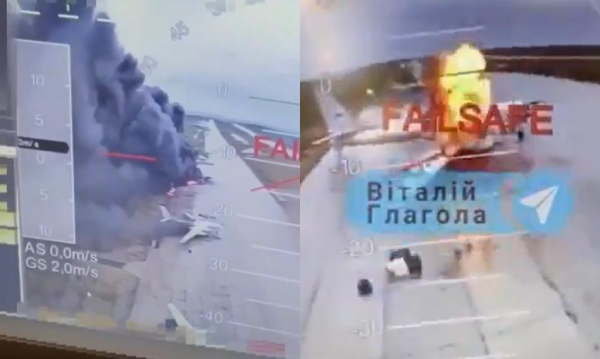Just like Japan's attack on Pearl Harbor in 1941, the Ukrainian operation “Web” carried out on Sunday rewrote the rules of warfare, said Max Boot, a Washington Post commentator and expert at the American Council on Foreign Relations, on Monday.

No one could have imagined that on Sunday, December 7, 1941, the Imperial Japanese Navy would sail unnoticed across the ocean to attack what American strategists called an “impregnable fortress,” the Pearl Harbor base in Hawaii. Enemy aircraft, which took off from six aircraft carriers, destroyed or damaged 328 American aircraft and sank or damaged 19 ships, including eight battleships, Boot recalls in the Washington daily.
The attack on Pearl Harbor rewrote the rules of warfare and opened a chapter in which aircraft became the dominant force in naval warfare. Similarly, Sunday's operation “Spiderweb”, which must have been an absolute shock to the Russians, as the attack of the Japanese navy was to the Americans, writes a new chapter in the art of warfare – the author assesses.
The Security Service of Ukraine (SBU) reported that as part of a special operation involving simultaneous drone strikes on four military airfields in Russia, 41 Russian strategic aviation aircraft were damaged, including the A-50, Tu-95, Tu-22 M3 and Tu-160. The head of the Ukrainian government's Center for Counteracting Disinformation (CDC), Andriy Kovalenko, reported that at least 13 aircraft were destroyed as a result of Operation Web.
It is no wonder that Russian bloggers began to compare the Ukrainian operation to Pearl Harbor. The comparison is not entirely appropriate, because the attack of the imperial fleet on the USA meant the beginning of a new war, while the “Spiderweb” was another attempt to defend against the aggressor – Boot notes.
But the analogy makes sense because both attacks marked the beginning of the end of “once-dominant weapons systems: battleships in 1941 and manned aircraft today,” the commentator emphasizes.
Boot points out that the history of Operation Web will now be keeping generals and strategists awake at night. If Ukrainian drones were able to reach very important air bases in a “police state like Russia undetected, what will prevent the Chinese from carrying out a similar attack on US air bases? Or the Pakistanis on Indian bases? Or North Korea on South Korean bases?”
Operation “Spiderweb” will not be the decisive blow in this war. But just as Pearl Harbor was a signal that Japan would be a much more dangerous adversary than most of the West thought, Sunday's attack now proves that the Ukrainians are much more capable, flexible and courageous soldiers than anyone could have expected, the author concluded.
Experts: Ukrainian attack on Russian military airports changes thinking about armed conflicts
The attack on military airports deep in Russia is not only a multi-level success for Ukraine; the operation will have far-reaching geopolitical consequences and will change the way we think about armed conflicts – say experts Robert Pszczel from OSW and Marek Budzisz from Strategy&Future.
As Robert Pszczel, an expert at the Centre for Eastern Studies in Warsaw and former director of the NATO Information Office in Moscow, told PAP, the operation of the Security Service of Ukraine codenamed “Spiderweb” is not only a military and propaganda success. “The Ukrainians – not for the first time – have shown that they have the ability to reverse the equation in terms of the strategy used by the Russians, i.e. conducting, as they call it, cognitive warfare, which consists in sowing fear in the enemy,” the analyst explained, adding that the attack also exposed the helplessness of the Russian services, i.e. what the Putin regime prided itself on – a system of total control and security.
Pszczel noted not only the finesse and effectiveness of the operation, but also the time it was carried out. In his opinion, this was an important signal before the peace talks in Istanbul. “The game is constantly about the support of the American administration. Donald Trump has said several times that the Ukrainians do not have any cards in this war. And with this action, the Ukrainians have shown that they do,” he emphasized.
According to Marek Budzisz, an analyst at Strategy&Future, the attack opens a new stage, not only in the Russian-Ukrainian war, but generally in thinking about armed conflicts.
“Relatively inexpensive systems can be used to destroy targets of very high strategic importance. Until now, we only knew this strike formula from movies,” the analyst said.
He pointed out that the Ukrainians have put into practice two long-developed concepts that will determine the direction of the evolution of unmanned systems. The first is the use of an artificial intelligence module. “Thanks to it, the operator does not have to use radio waves to pilot the drone. And if they are used, it is more difficult to jam this type of attack system and it is more difficult to destroy,” Budzisz explained and added that the second innovative element is the use of not individual systems, but swarms of drones.
According to the expert, the action will irreversibly change the approach to communication security worldwide. “In fact, all global trade currently takes place in the container system. Each of these containers can be an element of aggression, because dormant systems, activated at the right time, for example in a port, can lead to the destruction of critical objects,” the PAP interlocutor explained.
As Budzisz noted, the action of Ukrainian services may also disrupt the nuclear balance. It is estimated that before the war, Russia had 55 strategic bombers. The number of those destroyed or damaged in Sunday's attack still needs to be confirmed by sources other than the SBU, but – according to the expert – it may turn out that one of the components of the Russian nuclear triad has been seriously weakened.
Strategy&Future analyst drew attention to another far-reaching effect of Operation “Spiderweb”. The bombers destroyed on Sunday were based in open space due to the regulations included in the New START treaty signed in 2010 by the USA and Russia (in 2023, Putin announced that he was suspending Russia's participation in the treaty, but was not withdrawing from it – PAP). This solution was intended to allow each side to count what the other side had. “If the planes were in hangars, they would not have been destroyed,” the expert noted and explained that this could prompt the Russians to secure the remaining machines. And the lack of verification mechanisms will make it difficult to build a new disarmament order or any agreements stabilizing the global situation at the strategic level.
On Sunday, the SBU carried out a strike on four Russian military airfields in the Amur, Ivanovo, Murmansk and Ryazan regions. As a result of the attack, the Tu-95MS and Tu-22M3 strategic bombers, the A-50U early warning aircraft and the Il-22 reconnaissance aircraft, which were invaluable to the Russian Air Force, were allegedly destroyed or damaged. The attack involved swarms of drones that took off from containers delivered by trucks near the targets, probably by unaware drivers.
According to the Institute for the Study of War, citing sources in the SBU, 41 aircraft were destroyed, and the estimated value of Russian equipment losses was about $7 billion. The action was the culmination of 18 months of preparations.
Ukrainian President Volodymyr Zelensky said that 117 drones were used in the operation, and that 34 percent of Russian strategic bombers capable of carrying cruise missiles were allegedly stolen from them.
According to an analysis published on Euromaidan Press the day after the attack, training of the AI systems in the drones used in the attack had been ongoing since last year. By introducing thousands of photos, they were trained to find and recognize specific types of Russian aircraft.
The Ukrainian defense budget for this year assumes that USD 2.6 billion, which is one-fifth of all arms purchases, will be allocated for drones. (PAP)
dec/ mal/ lm/fit/ mms/arch






